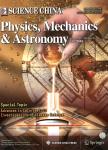版权所有:内蒙古大学图书馆 技术提供:维普资讯• 智图
内蒙古自治区呼和浩特市赛罕区大学西街235号 邮编: 010021

作者机构:Faculty of Information TechnologyBeijing University of TechnologyBeijing 100124China Beijing Key Laboralory of Trusted ComputingBeijing 100124China Guangxi Key Laboratory of Crptography and Information SecurityGuilin 541004China Information Security CenterState Key Laboratory of Networking and Switching TechnologyBeijing University of Posts and TelecommunicationsBeijing 100876China College of Computer Science and TechnologyNanjing University of Aeronautics and AstronauticsNanjing 211106China
出 版 物:《Science China(Physics,Mechanics & Astronomy)》 (中国科学:物理学、力学、天文学(英文版))
年 卷 期:2021年第64卷第6期
页 面:121-124页
核心收录:
学科分类:07[理学] 070104[理学-应用数学] 070201[理学-理论物理] 0701[理学-数学] 0702[理学-物理学]
基 金:supported by the National Natural Science Foundation of China(Grant No.62071015) the Beijing Municipal Science&Technology Commission(Grant No.Z191100007119004) the Guangxi Key Laboratory of Cryptography and Information Security(Grant No.GCIS201810)
主 题:quantum cryptography quantum secret sharing participant attack
摘 要:In a recent article[Gao et al.,***.63,120311(2020)],a two-receiver measurement-deviceindependent quantum secret sharing(MDI-QSS)protocol was *** was proven to be secure against eavesdropping and generalized to the multireceiver ***,the participant attack is a fatal threat to QSS ***,we highlight that a dishonest participant can obtain a sender’s secret message alone without introducing any detectable error,evidencing the vulnerability of the MDI-QSS protocol to the participant attack.